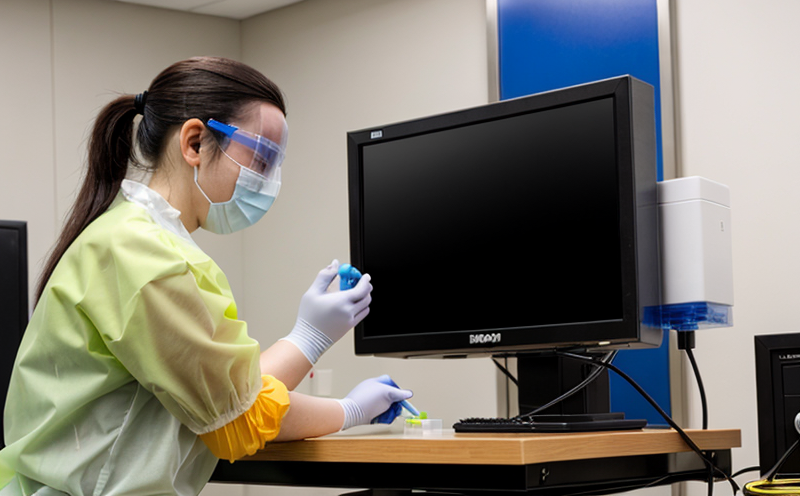GC-MS Analysis of Volatile Organic Compounds from Devices
The analysis of volatile organic compounds (VOCs) in medical devices is a critical aspect of ensuring product safety and compliance with international standards. GC-MS (Gas Chromatography-Mass Spectrometry) is the preferred technique for this purpose due to its high sensitivity, selectivity, and ability to identify a wide range of compounds.
Medical devices are subject to stringent regulations aimed at preventing adverse health effects from exposure to VOCs. The presence of these compounds can originate from various sources such as adhesives, solvents used in manufacturing processes, or even packaging materials. Identifying and quantifying these compounds is essential for the quality managers, compliance officers, R&D engineers, and procurement teams responsible for ensuring product safety.
The GC-MS analysis involves several steps that are crucial to obtaining accurate results. First, a sample of the device must be prepared by extracting VOCs using either solvent extraction or thermal desorption techniques. The extracted compounds are then injected into the gas chromatograph, which separates them based on their boiling points and polarity.
Following separation, each compound is introduced into the mass spectrometer where it undergoes ionization and fragmentation. This process allows for precise identification of the compounds present in the sample. The resulting mass spectra can be compared against known standards to confirm the identity of each compound detected.
The analysis typically adheres to several international standards including ISO 10993-22, which specifies the biocompatibility evaluation methods for medical devices. Compliance with these standards is crucial not only for regulatory approval but also to maintain a good reputation in the industry.
Quality managers and compliance officers can leverage GC-MS analysis to monitor changes in manufacturing processes that might inadvertently introduce new VOCs into their products. R&D engineers benefit from this service by being able to assess potential issues early on during product development. For procurement teams, it provides assurance that all materials used meet strict safety criteria.
By utilizing GC-MS technology, laboratories like Eurolab can offer reliable and accurate data about the VOC content of medical devices. This information is vital for maintaining compliance with regulatory requirements and ensuring patient safety.
Applied Standards
The application of relevant standards ensures that our testing methods meet the highest quality benchmarks required by international bodies. For GC-MS analysis specifically, we follow ISO 10993-22 for biocompatibility evaluation. This standard outlines procedures to identify and quantify VOCs in medical devices.
- ISO 10993-22 specifies the use of appropriate sampling techniques and sample preparation methods.
- This includes guidelines on how to handle samples from different types of medical devices to ensure accurate results.
The standard also provides criteria for selecting the most suitable extraction solvents and conditions based on the nature of the device material. By adhering strictly to these guidelines, we ensure that our findings are both reliable and repeatable.
- Adherence to ISO 10993-22 guarantees consistency across multiple tests performed by different analysts within a laboratory setting.
- This standardization helps maintain the integrity of data reported back to clients who rely on these analyses for making informed decisions regarding product safety and regulatory submissions.
Our commitment to following such stringent protocols reflects our dedication to providing accurate, reliable results that meet or exceed industry expectations. Clients can trust Eurolab's expertise in conducting GC-MS analysis according to international standards like ISO 10993-22.
Eurolab Advantages
At Eurolab, we pride ourselves on offering a comprehensive range of services tailored specifically to meet the unique needs of our clients within various sectors. Our expertise lies in providing cutting-edge analytical solutions that go beyond basic compliance testing.
- We have state-of-the-art instrumentation capable of detecting trace levels of VOCs down to parts per billion (ppb).
- This precision is particularly important when dealing with sensitive medical devices where even small amounts of impurities could pose risks.
Our highly trained and experienced staff ensures that every step from sample collection through final reporting adheres strictly to best practices outlined by recognized standards. This includes rigorous quality assurance measures at all stages of the process, guaranteeing accurate results every time.
- We maintain accreditation according to ISO/IEC 17025, ensuring our methods and facilities comply with international requirements for competence in testing and calibration services.
- This accreditation demonstrates our commitment to delivering high-quality analytical data that can be used confidently by regulatory agencies worldwide.
In addition to technical proficiency, Eurolab understands the importance of timely communication. Our transparent approach ensures clients are kept informed throughout each phase of their project, from initial consultation right through final deliverables. This level of service sets us apart and helps build lasting relationships built on trust and mutual respect.





